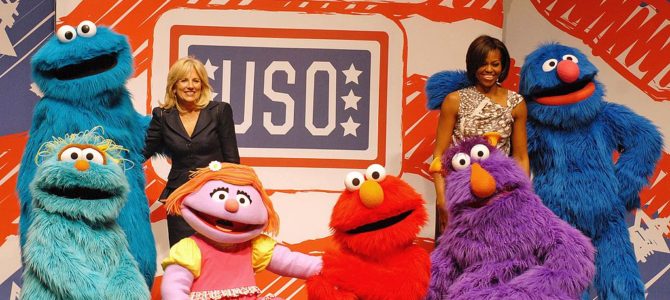
The popular TV program “Sesame Street” will soon feature Billy Porter, a cross-dressing homosexual entertainer. According to the Huffington Post. “Billy Porter dusted off his now-iconic velvet tuxedo dress for a forthcoming appearance on ‘Sesame Street.’”
Yes, that fun and often educational children’s TV series that taught you the letters of the alphabet decades ago is now preparing to teach your kids or grandkids that men dressing like women and having intimate relationships with other men is as normal as learning the alphabet —and how to form those alphabet letters into real words, like gay and transgender.
“Children are sponges. They soak up everything they are exposed to. For instance, if a child is exposed from birth to three different languages, he will become fluent in all three in what appears to be an effortless fashion,” says the American College of Pediatricians.
Young children learn through imitation. According to Parents magazine, “By 15 months, most toddlers have developed the motor and cognitive skills necessary to carry out the action to be imitated. Children this age are usually mobile and have some hand-eye coordination. What drives toddler imitation? In part, it’s the instant connection that mimicry creates between parent and child.”
Children imitate more than their parents. Watching a cross-dressing gay man interact with their favorite TV characters is sure to affect impressionable young minds.
No doubt the producers and writers of “Sesame Street” are well aware that, as reported by the Center on Media and Child Health, “In young children, television can negatively impact a variety of executive functions. In older children and teens, violent media can lead to poorer results on executive functioning tests.” Television programs are influential; that is beyond question. What is open to argument is whether a program’s influence is positive or negative.
“Sesame Street” was designed to teach young children positive messages in an entertaining fashion. The “Sesame Street” crew has always known the persuasive potential of TV as a teaching tool.
As Maureen Healy, an author who specializes in children’s emotional health, wrote: “Children up to the age of eight are the most impressionable… Up to this point, they cannot distinguish what is seen on television or in video games from reality. They often imitate what they see, believing that monsters are real and people can have super powers. To ensure that children have positive experiences and learn the difference between a game or show and what happens in real life, parents must pay attention to what kids are viewing.”
The evidence is conclusive: television programs have enormous power to influence and even indoctrinate young children’s minds. So, if an immensely popular children’s TV series like “Sesame Street” uses its teaching platform to teach its young viewers that homosexuality and transgenderism are normal and healthy, is it telling the truth? Is it helping or harming those impressionable young minds?
Recent polls show that a significant majority of Americans (63 percent in a Pew Survey) say they approve of homosexual relationships. U.S. culture is increasingly and now majority-affirming for LGBT people. Yet LGBT people still struggle with mental and physical health compared to heterosexual peers.
“[F]ew homosexual relationships last longer than two years, with many men reporting hundreds of lifetime partners,” according to a research review by international scholars. Monogamous marriage reduces the risk of heart attack. Committed partners become less sensitive to pain. People in long-term monogamous relationships also tend to live longer.
According to the Centers for Disease Control and Prevention, “Studies have shown that, when compared with the general population, gay and bisexual men, lesbian, and transgender individuals are more likely to: Use alcohol and drugs, Have higher rates of substance abuse, Not withhold from alcohol and drug use, and Continue heavy drinking into later life.”
Meanwhile, 65 percent of Hispanics age 18 to 29 said they have experienced discrimination. Yet substance abuse among this cohort is not higher than the national average. As long as it remains possible that homosexual and transgender behavior might in itself cause LGBT people’s higher health risks, caution should be the byword regarding messages—including from popular TV shows—to impressionable children.
Further, regardless of the potential effects of LGBT identification, sex and sexuality is simply not an appropriate topic for small children, who are nowhere near puberty. Sex is an adult topic, period.
Healy writes, “To ensure that children have positive experiences and learn the difference between a game or show and what happens in real life, parents must pay attention to what kids are viewing.” Unfortunately, many parents—perhaps most—assume “Sesame Street” is a safe children’s TV program and may not feel the need to pay attention to what the program is teaching their children.
That’s why LifeSite News has begun a petition to demand that the producers of “Sesame Street” drop the “Drag Queen” episode. Please go sign this petition—and pay attention to the programs that influence your children.









